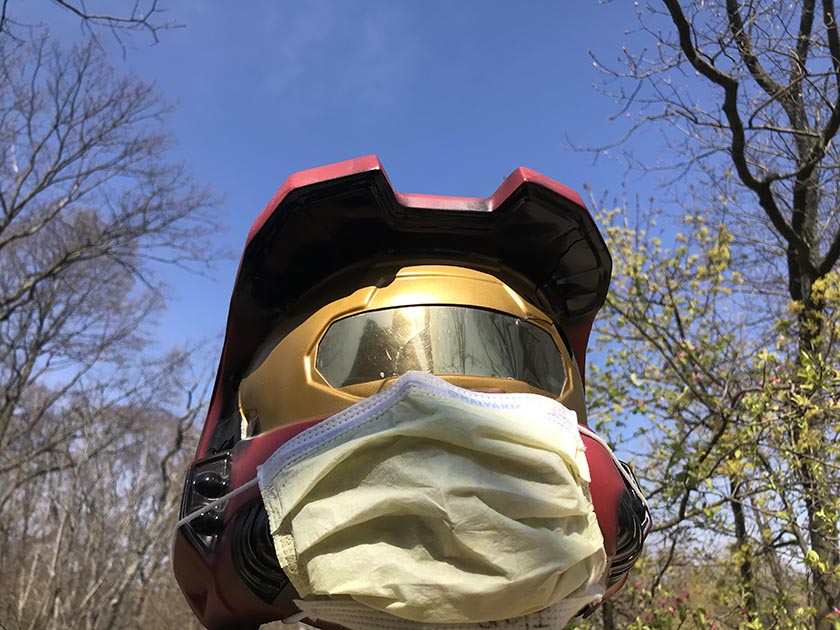New York has been very quiet for over a month now.
The bars, coffee shops and nightclubs are shuttered. Fancy clothing stores are boarded up. No more shows on Broadway.
Times Square is a ghost town, with neon ads appealing to a limited audience: a few vloggers documenting the apocalypse with their iPhones and a lone homeless preacher urging everyone to repent their sins. (He might have a point there.) The crazy people stand out, now that the rest of the world has gone into hiding.
A few sane humans are still on the streets, rushing to take care of basic necessities. Walking the dog, getting groceries, going to work at the hospital. We pass each other hurriedly or step off the sidewalk, tightening our facemasks and gloves to make sure they are securely in place, flinching when we hear someone else cough. The other people are the threat.
Stay the fuck away from me.
Under ground, regular life continues. There are fewer subway trains now, but the poor people still need public transportation. They need to get to their shitty and dangerous job at Trader Joe’s, or bring Tylenol to Aunt Marisol who is fading away with high fever in her tiny Bronx apartment. Most of them cannot afford a taxi or Uber, not that it’s a risk-free mode of transportation either. So they cram next to each other on the rare D train, spreading the virus further.
On the bright side, some liquor stores remain open. Essential commerce in hard times! And you can still order from good restaurants – for delivery or curbside pick-up. For the right price, foie gras is all yours – in the comfort of your own home. But the era of people watching in a crowded brasserie is long gone.
Sirens regularly pierce the silence. For the medical profession, first responders, and morticians there is no shortage of demand. We all know what that chilling sound usually means.
Down goes another one.
One day, this nightmare will gradually end. Hopefully, warmer summer weather will slow down the virus. And eventually, enough people will get it, survive and emerge with immunity. (But the jury is still out on how long that immunity will last and how bulletproof it is.) In about a year, a vaccine may be developed and mass-produced. Finally, the virus could just mutate into a less lethal form. One way or the other, pandemics run their course. The big questions are the number of dead bodies that will be left behind, and how much of the global economy will be destroyed.
When we start to come out of hibernation, the virus will not be completely defeated yet. And there is some chance it will linger on the outskirts of our world for a very long time, until we find a silver bullet. We will need to resume our lives in a more thoughtful, careful manner. In many ways, we will have to reinvent our world.
What will this changed world look like? If you follow science fiction, you already know. Otherwise, consider using the rest of quarantine downtime to read Orwell, watch Total Recall and brush up on classic episodes of The Twilight Zone.
The Brave New World
Robotics will be a hot industry. The rise of a new economy run by machines, already a trend before the pandemic, will only accelerate. Services performed without human contact, and without relying on humans, will be in high demand.
You want a robot waiter rolling up to your restaurant table, taking your order and immediately relaying it wirelessly to the kitchen. It will not forget that you wanted the hazelnuts on the side, will not give you attitude, and will not expect a tip. And it won’t cough on you.
For similar reasons, you want a speedy drone flying up to your front door, delivering pizza still hot from the oven. And a driverless Uber taking you to your destination.
If you want it, they will build it for you. “They” will be mostly robots too. If you are an executive in any manufacturing industry, whether making cars or sausages, you must seek to mechanize as much of your production chain as possible. That way, your factory can continue to operate when the next pandemic comes.
The military, who often spearhead technological progress, were already heading in this direction. The pandemic will prompt them further, now that we have seen two aircraft carriers incapacitated by raging infections among sailors onboard. That wouldn’t happen with sailors made of metal who run on batteries. The battlefield of the future will be mostly populated by robots and drones, firing at each other from long distances. “Mano a mano” combat will be increasingly rare. The Terminator is coming.
And yes, this means some traditional jobs will disappear. People will need to figure out something else to do for a living. Like, robot design and maintenance. And operating the growing Surveillance State, which many Asian regimes relied on to smoke out infected people, monitor their movements, and trace their contacts.
The human jobs that remain will be done differently. Where possible, telecommuting and buying most things online will become the norm. Telecom and Big Data will benefit.
But in the real estate world, this means the high-rise office building business model needs to reinvent itself, if it is to survive. Stuffing workers into communal workspaces, with cubicles bunched close together, cannot go on. And what about crowded elevators? Now it will be only four people in at once, one in each corner. Expect long lines, 6 feet apart, snaking out onto the street at the beginning of the business day, to get to that 44th floor reception desk.
Ditto for the residential market: there will be a trend away from dense urban areas and tall apartment buildings. More people will look to the suburbs. Having your own house, and plot of land separating you from others, will be more en vogue.
But people still want to mingle, you might say. OK. Welcome to parties in hazmat suits. I’m not kidding. Or by invitation only, for people who can prove immunity or a negative test within the last few hours.
Speaking of parties, cannabis will quickly become legal in most places where it hasn’t already. Crippled by the economic downturn, burdened with huge expenses to sustain the growing masses of unemployed and bail out failing businesses, many states will be desperate to generate revenue and stimulate local consumption. And filling overcrowded jails with more people for minor offenses — which the drug trade is, in the grand scheme of things — will be frowned upon.
As long as we are talking about weed, edibles will continue to displace old-fashioned smoking. Vaping and cigarettes will decline in popularity. Hopefully, enough people now appreciate the need to preserve healthy lungs. You might need them some day.
Dating and flirtation will become even more Web-based. Steamy FaceTime sessions will be the norm. Here too, robotics offers promising possibilities. A wise friend of mine once predicted: “The person who invents a device that allows you to have full body virtual reality sex with someone else remotely will be the world’s first trillionaire.” Elon Musk, stop wasting time on rockets and get to the really important work!
Churches may never recover. We have all seen now that communal religious rituals can be done on Zoom. A crowd of singing worshippers cooped up in a chapel is a feast for the virus.
Same for fancy restaurants. A few will survive by jacking up prices, relocating to wide hangar-size spaces and becoming more exclusive. But fast food delivery and drive-throughs will dominate. (And for movies, drive-in outdoor screenings might make a comeback. Old-school movie theaters? Forget it.) If you want a middle class sit-down dining experience, consider an outdoor beer hall with lots of space between tables. Served by robot waiters, as described above.
Still want to see the world? Traveling will be much harder. Doing it safely is expensive (one widebody jet plane for 20 carefully screened passengers?), and doing it unsafely will not be allowed.
And even if you could get to another country, don’t expect a warm welcome. You will either be turned away at the border, or get placed in quarantine for 2 weeks. So much for the global world.
Just want to sail at sea, without crossing borders? Sure, if you can afford your own boat. Even fanatical travelers will stay away from cruise ships now. Not only are they floating petri dishes for pandemics; the COVID-19 crisis has shown that an infected ship may not find a safe haven to disembark its passengers.
The Changing Global Chessboard
The pandemic has unmasked rifts among nations, which were already festering for a while. Globalization, it seems, is not all it was cracked up to be. At the end of the day, we are still just a bunch of tribes, suspicious of other tribes. The supranational organizations that were supposed to unite us failed miserably.
Many nations worked in silos, developing their own tests, even though a German formula was posted online early for all to see. When its unity was tested, the EU laid an egg. Italy was left to fend for itself. Most countries rushed to seal off borders, bringing Europe’s Schengen experiment to a close.
In a world where each person may be a deadly virus carrier, a foreigner will not get the benefit of the doubt. Preference will be given to members of your own tribe. And even compatriots faced many hurdles and stigma when trying to return from overseas trips. While a plane full of Ukrainians coming home from China circled in the air, looking for a place to land, protests erupted on the ground — in every town rumored to be their destination. Later, their buses were pelted with rocks by angry locals in the village chosen as their quarantine location.
Not in my goddamn neighborhood.
The United States often claims to be the world leader. What kind of global leadership did America provide in this crisis? Can America’s response, so far, be viewed as a glowing success of the Western model?
The PR spin masters are feverishly at work, trying to deflect attention and blame. “China lied and people died.” But most Americans will not be fooled. They will not forget the shortage of testing kits, facemasks and toilet paper, all of which continues to this day. The lines of unemployed folks at soup kitchens. The nursing homes, jails and homeless shelters full of doomed people waiting to be infected – my frail father among them. And the $2 trillion spent mostly to prop up big corporations, consistent with the trend from the last recession: in good times investors reap the benefit of profits, and in bad times the American public subsidizes the losses. That’s not how true capitalism is supposed to work.
Bernie Sanders lost the battle, but won the war. A private health care system built on making profit, rather than serving the nation as a public good, cannot continue. No other developed country handles medicine this way. The corporate elites, their lobbyists and their media talking heads will resist “socialized medicine” as long as they can, but change is inevitable. If it cannot be delivered by the corrupt political system, a violent protest movement will emerge. Ultimately, the people’s voice matters. It brought us workers’ rights, women’s suffrage and desegregation. One day, it will bring universal health care for all Americans.
None of this is to say that the pandemic showed authoritarian systems to be superior in a crisis. China and Singapore seem to have weathered the storm well, but Iran clearly did not. Russia’s pandemic is still in early stages, and the outcome is uncertain. On the other hand, while America sputtered, Germany and New Zealand have held up well. But this disparity of outcomes shows that some authoritarian systems do work well, and some democracies can fail spectacularly. The one thing this stress test did not prove is that democracy kicks dictatorship’s ass.
If anything, the crisis suggests that the contrast between dictatorship and democracy is simply not relevant. The true test is whether a country is governed by people who care about their nation’s well-being, exercise prudent collective judgment, and have effective tools to implement their decisions at the local level. It helps when the majority of the population is disciplined, can be mobilized quickly, and trusts their government. On all these counts, China outperformed the United States.
Here too, the pandemic simply highlighted – and accelerated — a trend that was visible for some time. Like it or not, the mythical hope of a benevolent American hegemony presiding over a universally democratic world is evaporating. A multi-polar world has emerged, whose center of gravity is shifting toward Asia, where the Chinese pole is growing in importance. And even in the United States, the future of capitalism as it is currently practiced – sink or swim for the masses, low tax rates for the rich, and a war machine financed by the Fed’s printing press – does not look bright. America must change how it treats its own people, and the world at large.
America’s elites do not seem ready to accept this reality. They are determined to keep swimming against the tide in a futile effort to reassert American dominance. But this will be harder to do with a severely damaged economy and a restless population increasingly demanding a shift in priorities. Printing money and municipal bonds may stave off collapse, but is not good for the dollar’s survival as the global reserve currency in the long run. In its heyday, America kept its allies and others in check with a mix of sticks and carrots. Now the carrots are in short supply.
That may force the United States to rely even more on its military power, which is still awesome. But even in the military arena, America’s relative advantages are now eroding, as China quickly builds its navy, Russia develops hypersonic missiles that make U.S. aircraft carriers useless, and more nations acquire nuclear weapons. Even worse, an empire that depends solely on brute force to remain on top eventually provokes all other tribes to unite against it. In sum, we are heading for more dangerous, unstable times, while the global power structure remains in transition.
This transition could end very badly for all of us. Or it could lead, over time, to a more balanced global system where big players treat each other as equals, abide by a well-defined set of rules, and collaborate in times of crisis. But to help get us there, America will need leaders with brains, compassion, and courage to challenge the status quo.
Good luck, people.
Vadim Mahmoudov
April 19, 2020.





Hello Vadim,
Very interesting contribution as usual. I’m not sure the EU laid that big of an egg. Even though it was not reported on outside of Europe, Germany, Luxembourg and Austria took patients from the completely overburdened Alsace hospitals (oh, the irony ….), and German head of the EU Commission Ursula Van der Leyen roundly chastised those who did not do much in Europe. Given the size of the debt crisis, some kind of EU mechanism, or mechanism done by some EU states to pool their debt may be necessary – the Germans will soon realize that if they want people outside of Germany to still have the money to buy their Beemers & Porsches, they’ll have to do something drastic (like, spend money themselves or agree to some form of Eurobonds ….).
For China’s rise, I don’t know. They got caught red-handed sending BS data (the medical community here in France is very clear that they were fed incorrect information on both the contagiousness of the disease and the frequency of serious cases), and their number of deaths is so low as to be as credible as North Korean election results. I am not sure their leadership has emerged unscathed – the pathetic way in which they turned heroic whistleblowers, who were jailed for even saying there was an epidemic, into official heroes, victims of local party officials who did not follow the brilliant guidance from on-high is … well, as credible as it sounds.
One of the most ironic things in this situation is that Trump’s erratic behavior endangers his presidency in the most direct way possible. I am not talking about who wins the spin war, or whether the economy will recover. But this is a guy whose electorate is overwhelmingly male, older, and rural, and who encourages said electorate to flout anti-epidemic measures, even though they are demonstrably more likely to experience serious and even deadly forms of the disease (men represent between 60 and 80 % of deaths, the disease is clearly more serious for older people, and rural areas are terribly short of hospitals …)
All the best,
Nicolas
All well said, Vadim.
I don’t know about other countries, but but as for the US of A, the greatest fear that I have is that things WILL start changing, and may start changing rather quickly. At a much faster pace than people are really ready for.
The socialized medicine just might become reality. However, I am afraid that it will happen for a wrong reason. The goal of medicine is .. medical help. I want to see it stay that way, rather than trying “to keep those who need affordable medicine to get affordable medicine”. Just won’t want to see situation to swing to diametrically opposing pole.
Great essay, Vadim! Thank you and lets hope for the best scenario )